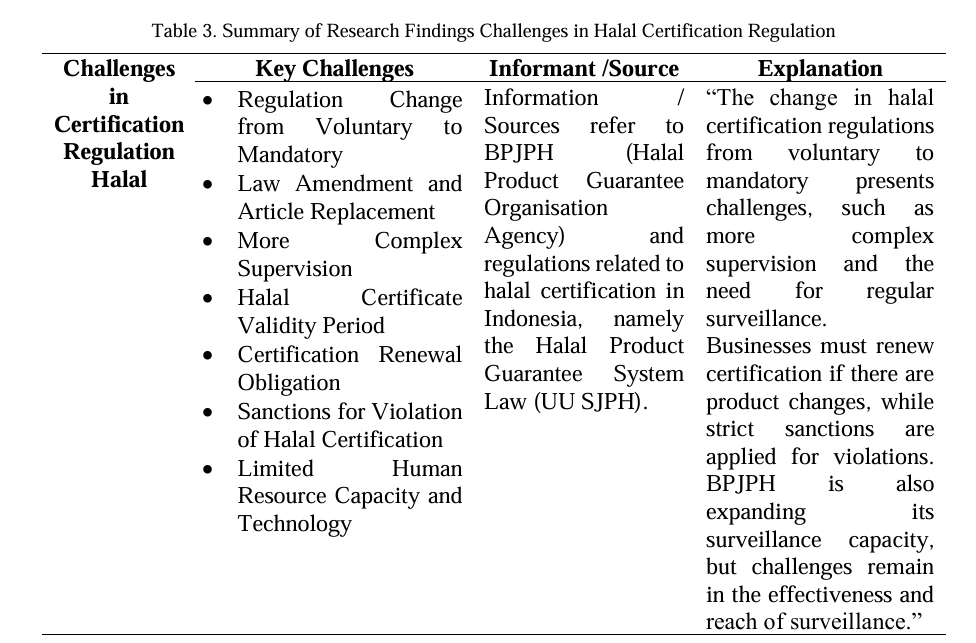Assessing the Reliability of Halal Certification Implementation: A Qualitative Study on Perceptions of Halal Supervisors and Micro Business Actors
DOI:
https://doi.org/10.23917/jisel.v8i01.7305Keywords:
Halal Product Quality, Phenomenological Approach, Halal Certification, Halal Product Guarantee System, Governance, Micro and Small EnterprisesAbstract
The potential for a critical point in the food and beverage sector has led to the emergence of a crucial role in the halal industry. This research aims to examine more deeply the halal industry governance system in micro and small businesses in the food and beverage sector by reviewing the legal perspective of the halal product guarantee system in the Bangkalan and Surabaya areas, as well as diagnosing the halal certification of micro and small businesses after obtaining a halal certificate. This research uses the phenomenological method by collecting primary data through interviews with informants, namely two business actors and one halal supervisor from the Halal Inspection Institute. Researchers also took data from focus group discussions with the Halal Product Guarantee Organizing Agency. The research results show that micro and small business actors consistently implement a halal product guarantee system by the provisions of the halal product guarantee system law. Apart from meeting halal standards, business actors also emphasize the importance of maintaining product quality at every stage of the production chain. This research also found that after halal certification was issued, micro and small businesses continued to make improvements and breakthroughs to ensure product quality and halalness were maintained throughout production. This research does not explore the social and economic factors of micro and small business actors in obtaining halal certificates. However, this research provides a perspective on consistently implementing halal governance by the halal product guarantee system law, which can help increase quality values.
Downloads
References
Ab Rashid, N., & Bojei, J. (2020). The relationship between halal traceability system adoption and environmental factors on halal food supply chain integrity in Malaysia. Journal of Islamic Marketing, 11(1), 117–142. https://doi.org/10.1108/JIMA-01-2018-0016
Abdallah, W., Harraf, A., Ghura, H., & Abrar, M. (2024). Financial literacy and small and medium enterprises performance: the moderating role of financial access. Journal of Financial Reporting and Accounting. https://doi.org/10.1108/JFRA-06-2024-0337
Abdur-Rauf, I. A., & Raimi, L. (2024). A Conceptual Discourse on Islamic Finance Investment Modes for Established and Emerging Entrepreneurs: Tripartite Implications. Journal of Business and Economic …, 7(2), 1–9. http://resdojournals.com/index.php/jbeo/article/view/341%0Ahttps://resdojournals.com/index.php/jbeo/article/download/341/494
Ajer, B., Ngare, L., & Macharia, I. (2023). Drivers of innovation in the agro-food micro, small and medium enterprises of Uganda. Journal of Agribusiness in Developing and Emerging Economies, 14(5), 979–996. https://doi.org/10.1108/JADEE-09-2022-0206
Alfayed, V., & Fauziah, A. (2023). Peran Fatwa, Regulasi, dan Tata Kelola dalam Meningkatkan Kualitas dan Keamanan Produk Halal di Indonesia. International Conference On Islam Education Management and Sharia Economics, 4(1), 129–142. https://prosiding.stainim.ac.id
Aliyanti, F. E. (2022). The Implementation of Halal Supply Chain Management on Processed Meat Products in Yogyakarta. Journal of Islamic Economics Lariba, 8(1), 15–32. https://doi.org/10.20885/jielariba.vol8.iss1.art2
Ardiantono, D. S., Ardyansyah, G. D., Sugihartanto, M. F., Al Mustofa, M. U., & Lisdiantini, N. (2024). Mapping the barrier and strategic solutions of halal supply chain implementation in small and medium enterprises. Journal of Islamic Marketing, 15(7), 1673–1705. https://doi.org/10.1108/JIMA-08-2022-0229
Azam, M. S. E., & Abdullah, M. A. (2020). Global Halal Industry: Realities and Opportunities. International Journal of Islamic Business Ethics, 5(1), 47. https://doi.org/10.30659/ijibe.5.1.47-59
Bachtiar, W. F., Masruroh, N. A., Asih, A. M. S., & Sari, D. P. (2024). Halal food sustainable traceability framework for the meat processing industry. Journal of Islamic Marketing, 2021(3190). https://doi.org/10.1108/JIMA-12-2023-0412
Bag, S. (2024). From resources to sustainability: a practice-based view of net zero economy implementation in small and medium business-to-business firms. Benchmarking, 31(6), 1876–1894. https://doi.org/10.1108/BIJ-01-2023-0056
Bahara, R., Nur Aidi, M., Syamsu, K., Sunarti, E., Jayanegara, A., & Tieman, M. (2024). Exploration of global Halal food SMEs research through state approach: bibliometric analysis. Journal of Islamic Marketing. https://doi.org/10.1108/JIMA-02-2024-0061
Baidlowi, M. (2017). Mimbar Ulama: Perjalanan 42 Tahun MUI (M. Baidlowi (ed.)). Majelis Ulama Indonesia.
Baihaki, A., Rabiah Al Adawiah, & Hermawati, N. R. (2022). Perlindungan Hukum Terhadap Konsumen Atas Jaminan Produk Halal Pada Makanan Dan Minuman UMKM di Kota Bekasi. Krtha Bhayangkara, 16(2), 315–338. https://doi.org/10.31599/krtha.v16i2.1501
BPJPH. (2024). Badan Penyelenggara Jaminan Produk Halal. https://bpjph.halal.go.id/
Busch, M., Mühlrath, D., & Herzig, C. (2024). Fairness and trust in organic food supply chains. British Food Journal, 126(2), 864–878. https://doi.org/10.1108/BFJ-05-2023-0394
Bux, C., Varese, E., Amicarelli, V., & Lombardi, M. (2022). Halal Food Sustainability between Certification and Blockchain: A Review. Sustainability (Switzerland), 14(4), 1–18. https://doi.org/10.3390/su14042152
Choirunnisa, L., Oktaviana, T. H. C., Ridlo, A. A., & Rohmah, E. I. (2023). Peran Sistem Pemerintah Berbasis Elektronik (SPBE) Dalam Meningkatkan Aksesibilitas Pelayanan Publik di Indonesia. Sosio Yustisia: Jurnal Hukum Dan Perubahan Sosial, 3(1), 71–95. https://doi.org/10.15642/sosyus.v3i1.401
Darmalaksana, W. (2023). How is the halal certification policy implemented? Perspective analysis of small and medium enterprises (SMEs) in Indonesia. Journal of Islamic Accounting and Business Research. https://doi.org/10.1108/JIABR-12-2022-0342
Dashti, L. A. H. F., Jackson, T., West, A., & Jackson, L. (2024). Enhancing halal food traceability: a model for rebuilding trust and integrity in Muslim countries. Journal of Islamic Marketing, 2018. https://doi.org/10.1108/JIMA-06-2023-0167
De Sordi, J. O., Paulo, W. L. de, Santos, A. R. dos R., Nelson, R. E., de Azevedo, M. C., Hashimoto, M., & Cavallari Filho, R. (2024). Small businesses are not necessarily “small and medium-sized enterprises.” Journal of Small Business and Enterprise Development, 31(1), 1–30. https://doi.org/10.1108/JSBED-03-2023-0135
Ekka, P. M. (2024). Halal tourism beyond 2020: concepts, opportunities and future research directions. Journal of Islamic Marketing, 15(1), 42–58. https://doi.org/10.1108/JIMA-09-2022-0260
Elwardah, K., Yusniar, Y., Palembang, S. P., Harto, B., & Solapari, N. (2024). Pengaruh Sertifikasi Halal, Pemasaran Produk Halal, dan Kepuasan Konsumen terhadap Pertumbuhan Industri Halal di Indonesia. Jurnal Multidisiplin West Science, 3(05), 658–669. https://doi.org/10.58812/jmws.v3i05.1195
Fauzi, M. A., & Battour, M. (2024). Halal and Islamic tourism: science mapping of present and future trends. Tourism Review. https://doi.org/10.1108/TR-08-2023-0533
Fauzi, M. A., Mohd Ali, N. S., Mat Russ, N., Mohamad, F., Battour, M., & Mohd Zaki, N. N. (2024). Halal certification in food products: science mapping of present and future trends. Journal of Islamic Marketing, 2, 3564–3580. https://doi.org/10.1108/JIMA-12-2023-0407
Fernando, Y., Hendayani, R., Jawo, M., Rahamaddulla, S. R., Abdul Aziz, K., & Maimunah, N. (2024). Discovering Islamic marketing potential in shaping blockchain-based halal logistic services: a bibliometric analysis. Journal of Islamic Marketing. https://doi.org/10.1108/JIMA-06-2024-0258
Georgiev, E., & Georgiev, S. (2024). Decoupling of a management standard: how decision-makers reinterpret, renegotiate, and modify the adoption of ISO 9001. Benchmarking, 31(5), 1402–1425. https://doi.org/10.1108/BIJ-06-2022-0355
Giyanti, I., Indrasari, A., Sutopo, W., & Liquiddanu, E. (2021). Halal standard implementation in food manufacturing SMEs: its drivers and impact on performance. Journal of Islamic Marketing, 12(8), 1577–1602. https://doi.org/10.1108/JIMA-11-2019-0243
Glińska-Neweś, A., Escher, I., Józefowicz, B., & Łuka, A. (2020). Managing strategic paradoxes: the influence of demographic characteristics of decision-makers. Journal of Organizational Change Management, 33(5), 835–858. https://doi.org/10.1108/JOCM-07-2019-0243
Gunawan, S., Juwari, J., Aparamarta, H., Darmawan, R., & Rakhmawati, N. A. (2021). Pendampingan Berkelanjutan Sistem Jaminan Halal Bagi Usaha Mikro, Kecil, dan Menengah (UMKM). Sewagati, 5(1), 8. https://doi.org/10.12962/j26139960.v5i1.8120
Hadiyanto, R., Madjakusumah, D. G., & Azis, S. F. (2024). Jaminan Produk Halal Bagi UMKM Terhadap Implementasi Program Sertifikat Halal Gratis di Jawa Barat. Jurnal Ilmiah Ekonomi Islam, 10(03), 3333–3341.
Handayani, N. A., Nahariah, N., Asnawi, A., & Hikmah, H. (2023). Application of the Halal Guarantee System to Broilers in Traditional Markets: Worker’s Knowledge of Halal Guarantee. Hasanuddin Journal of Animal Science (HAJAS), 5(1), 44–55. https://doi.org/10.20956/hajas.v5i1.26991
Hanifasari, D., Masudin, I., Zulfikarijah, F., Rumijati, A., & Restuputri, D. P. (2024). Millennial generation awareness of halal supply chain knowledge toward purchase intention for halal meat products: empirical evidence in Indonesia. Journal of Islamic Marketing, 15(7), 1847–1885. https://doi.org/10.1108/JIMA-01-2023-0012
Hanun, N. R., Fitriyah, H., Hudi, L., Ningrum, S., Kusnah, E., Bisnis, F., Komunikasi, I., Sidoarjo, U. M., Sains, F., & Sidoarjo, U. M. (2023). Pendampingan Proses Produk Halal Dan Akuntansi. Jurnal Abdimas Bina Bangsa, 4(1), 668–675.
Hariani, D., & Hanafiah, M. H. (2024). The competitiveness, challenges and opportunities to accommodate the Halal tourism market: a Sharia-law tourism destination perspectives. Journal of Islamic Marketing, 15(3), 919–942. https://doi.org/10.1108/JIMA-05-2023-0147
Hasan, M., Harahap, T. K., Hasibuan, S., Rodliyah, I., Thalhah, S. Z., Rakhman, C. U., Ratnaningsih, P. W., Inanna, Mattunruang, A. A., Herman, Nursaeni, Yusriani, Nahriana, Silalahi, D. E., Hasyim, Sitti Hajerah Rahmat, A., Ulfah, Y. F., & Arisah, N. (2022). Metode Penelitian Kualitatif. In M. Hasan (Ed.), Jurnal EQUILIBRIUM (1st ed., Vol. 5, Issue January). Tahta Media Group. http://belajarpsikologi.com/metode-penelitian-kualitatif/
Helmi, B. S., Hidayat, K., & Fakhry, M. (2019). Pengaruh Undang Undang Jaminan Produk Halal Terhadap Pengembangan Produk Jamu Madura. Jurnal Pamator : Jurnal Ilmiah Universitas Trunojoyo, 12(2), 100–108. https://doi.org/https://doi.org/10.21107/pamator.v12i2.6280
Herianti, H., Siradjuddin, S., & Efendi, A. (2023). Industri Halal dari Perspektif Potensi dan Perkembangannya di Indonesia. Indonesia Journal of Halal, 6(2), 56–64. https://doi.org/10.14710/halal.v6i2.19249
Hidayana, N., Noor, M., & Omar, N. (2024). Balancing Motherhood and Entrepreneurship: a Phenomenological Study of Mumpreneur Business Restraining and Enabling Factors. Global Business Management Review, 16(1), 19–35.
Hindolia, A., Arya, J., Pathak, R., & Kazmi, A. (2024). Halal B2B marketing in the metaverse: crafting a conceptual framework to pinpoint opportunities and challenges, outlining the agenda for future research. Journal of Islamic Marketing. https://doi.org/10.1108/JIMA-02-2024-0054
Hsu, P. Y., Ku, E. C. S., Lai, T. C., & Hsu, S. (2022). Developing a Muslim tourism market: the perspective of travel agencies. Journal of Hospitality and Tourism Insights, 5(1), 166–185. https://doi.org/10.1108/JHTI-08-2020-0155
Indah, D., Murhaini, S., & Wijaya, A. (2024). Sertifikasi Halal: Analisis Hukum dan Impementasinnya Pada UMKM Kuliner di Palangka Ray. Palangka Law Review, 04(01), 36–46. https://doi.org/https://doi.org/10.52850/palarev.v4i1.14811
Islami, N. N., & Suhma, W. K. (2023). Implementation of Halal Certification: Perspective of Micro, Small, and Medium Enterprises for Food Products. Heritage: Journal of Social Studies, 1(1), 35–58. https://heritage.uinkhas.ac.id/index.php/hrtg/article/view/109%0Ahttps://heritage.uinkhas.ac.id/index.php/hrtg/article/download/109/46
Kamarulzaman, N. H., Muhamad, N. A., & Mohd Nawi, N. (2022). An investigation of adoption intention of halal traceability system among food SMEs. Journal of Islamic Marketing, 13(9), 1872–1900. https://doi.org/10.1108/JIMA-11-2020-0349
Khairani, W. S., & Hidayah, N. (2024). Halal product guarantee system in powdered goat milk production house. Journal of Halal Science and Research, 5(1), 77–84. https://doi.org/10.12928/jhsr.v5i1.7566
Khan, S., Khan, M. I., & Haleem, A. (2019). Evaluation of barriers in the adoption of halal certification: a fuzzy DEMATEL approach. Journal of Modelling in Management, 14(1), 153–174. https://doi.org/10.1108/JM2-03-2018-0031
Khasanah, M. (2024). The impact of habit and halal involvement on the intention to purchase international branded food: evidence from Indonesia. Journal of Islamic Marketing, 1759–0833. https://doi.org/10.1108/JIMA-09-2023-0289
Koeswinarno, K., & Zakiyah, Z. (2022). Konstruksi Kebudayaan Kuliner Non-Halal. Jurnal Sosiologi Agama, 16(1), 17–36. http://dx.doi.org/10.14421/jsa.2022.161-02%0Ahttps://ejournal.uin-suka.ac.id/ushuluddin/SosiologiAgama/article/download/161-02/1991
Lestari, F., Kurniawan, R., Arifin, J., Yasir, M., Muhammad Saleh, M., & Akbarizan. (2023). An integrated framework for the measurement of halal good manufacturing practices on the case of SMEs in the food sector. Journal of Islamic Marketing, 14(1), 82–105. https://doi.org/10.1108/JIMA-04-2021-0105
Luthfiyah, L., Putra, T. R., Sri, E., & Ningsih, R. (2024). Analisis Tantangan Dan Peluang Terhadap Pengembangan Produk Halal Olahan Hasil Laut Di Kecamatan Klampis Kabupaten Bangkalan. Journal of Business Economics and Management, 01(02), 96–113.
Maksudi, Bahrudin, & Nasruddin. (2023). Faktor-faktor Yang Mempengaruhi Sertifikasi Halal dalam Upaya Pemenuhan Kepuasan Konsumen. Jurnal Ilmiah Ekonomi Islam, 9(1), 825–840.
Masood, A., & Zaidi, A. (2023). Empowerment of SME’s sustainability in halal cosmetics’ ecosystem by diagnosing growth constraints. Journal of Islamic Marketing, 14(2), 622–644. https://doi.org/10.1108/JIMA-12-2020-0371
Mastuki. (2021). Update Sertifikasi Halal di Indonesia: Ekspektasi dan Kenyataan. Kementrian Agama Republik Indonesia. https://kemenag.go.id/opini/update-sertifikasi-halal-di-indonesia-ekspektasi-dan-kenyataan-hqk7g0
Maulida, M., Gunawan, M. A., & Rosyidah, H. (2024). Encouraging MSME Growth with Digital Platforms : Halal Competition and Innovation Strategy. International Conference on Islamic Economics (ICIE), 380–389.
Mohamed, Y. H., Abdul Rahim, A. R., & Ma’aram, A. (2020). The effect of halal supply chain management on halal integrity assurance for the food industry in Malaysia. Journal of Islamic Marketing, 12(9), 1734–1750. https://doi.org/10.1108/JIMA-12-2018-0240
Musadad, A., Rahman, T., Umami, R., & Sholeha, I. (2024). The Efforts of The Bangkalan Regency Government in Accelerating Halal Certification for MSMEs ; Analysis of the Norm Escalation Theory-Islamic Good Governance the authorized body , namely the Halal Product Guarantee Agency ( BPJPH / Badan Penyelenggara Ja. Jurnal Hukum Dan Ekonomi Islam, 18(01), 48–58. https://doi.org/10.21111/ijtihad.v18i1.11430
Nafisah, A., & Nisa, F. L. (2024). Mengoptimalkan Potensi Industri Makanan Halal Indonesia Dengan Prinsip Ekonomi Syariah. Sharia Economic Review, 1(1), 12–19.
Najmi, A., Ahmed, W., & Jahangir, S. (2023). Firm’s readiness for halal food standard adoption: assessing the importance of traceability system. Journal of Islamic Accounting and Business Research, 14(8), 1451–1473. https://doi.org/10.1108/JIABR-09-2020-0293
Othman, B., & Md Nawi, N. H. (2025). Halal standards practices in the food industry: the impact of halal assurance and operations. Journal of Islamic Marketing. https://doi.org/10.1108/JIMA-02-2023-0051
PP. No 7. (2021). Peraturan Pemerintah Republik Indonesia Nomor 07 Tahun 2021 Menengah. Undang-Undang, 1–121.
Purnama, M. Y., & Ulinnuha, R. (2023). Transformasi Pengetahuan Dan Realitas Sosial Pelaku Umk Tentang Label Halal. Jurnal Analisa Sosiologi, 12(4), 718–739. https://doi.org/10.20961/jas.v12i4.71327
Qizam, I., Berakon, I., & Ali, H. (2024). The role of halal value chain, Sharia financial inclusion, and digital economy in socio-economic transformation: a study of Islamic boarding schools in Indonesia. Journal of Islamic Marketing. https://doi.org/10.1108/JIMA-03-2024-0108
Raimi, L., Abdur-Rauf, I. A., & Olaide Raimi, B. (2024). Interdependence of halal entrepreneurship and Islamic finance for creating a strong halal ecosystem. Journal of Islamic Marketing. https://doi.org/10.1108/JIMA-05-2023-0162
Rajendran, S. D., Kamarulzaman, N. H., & Abd Rahman, A. (2024). The mediating role of halal supply chain integrity in enhancing performance for halal herbal-based food SMEs. Journal of Islamic Marketing. https://doi.org/10.1108/JIMA-03-2022-0090
Rambe, P., & Khaola, P. (2022). The impact of innovation on agribusiness competitiveness: the mediating role of technology transfer and productivity. European Journal of Innovation Management, 25(3), 741–773. https://doi.org/10.1108/EJIM-05-2020-0180
Rao, P., Verma, S., Rao, A. A., & Joshi, R. (2023). A conceptual framework for identifying sustainable business practices of small and medium enterprises. Benchmarking, 30(6), 1806–1831. https://doi.org/10.1108/BIJ-11-2021-0699
Rifas, A. H., Ab Rahman, A., Buang, A. H., & Abdul Talib, M. (2024). Business entrepreneurs’ intention towards takaful participation to mitigate risk: a study in Sri Lanka based on the theory of planned behaviour. Journal of Islamic Accounting and Business Research, 15(7), 1072–1092. https://doi.org/10.1108/JIABR-02-2022-0034
Rofi’ah, K., Safira, M. E., & Rosele, M. I. (2024). The Effectiveness of Accelerating Halal Product Certification: Regulations and Companions. Journal of Human Rights, Culture and Legal System, 4(2), 449–476. https://doi.org/10.53955/jhcls.v4i2.203
Rohmadi, R., Bagaskara, D. Y., & Hikmah, U. F. (2024). The SWOT Analysis of Halal Industry in Indonesia: NVIVO Study and Literature Review. Al-Muamalat: Jurnal Ekonomi Syariah, 11(1), 1–15. https://doi.org/10.15575/am.v11i1.33586
Ruhmah, A. A., Eravia, D., & Aslina, N. (2024). Digital Halal Entrepreneurship: Memaksimalkan Potensi Bisnis Halal Di Indonesia. Technical and Vocational Education International Journal (TAVEIJ), 4(1), 395–400.
Salaheldeen, M., & Battour, M. (2024). Fostering innovation capability and sustainable innovation in halal industry: the role of halal entrepreneurs’ success. Journal of Islamic Marketing, 15(3), 777–799. https://doi.org/10.1108/JIMA-12-2022-0323
Salqaura, S. A., Sipayung, R. C., & Amelia, W. R. (2023). Conceptualizing Halal Product in the Context of Culinary in the Digital Era: E-Commerce and Ride-Hailing Based. International Journal of Research and Review, 10(3), 404–415. https://doi.org/10.52403/ijrr.20230348
Silalahi, S. A. F. (2024). Do consumers need halal label? Evidence from small and medium enterprises segment in a major Muslim environment. Journal of Islamic Marketing, 15(2), 470–492. https://doi.org/10.1108/JIMA-12-2021-0401
Silvestri, R., Adamashvili, N., Fiore, M., & Galati, A. (2023). How blockchain technology generates a trust-based competitive advantage in the wine industry: a resource based view perspective. European Business Review, 35(5), 713–736. https://doi.org/10.1108/EBR-10-2022-0217
Sulastini, S., Surya, A., Husnurrofiq, H., Rahayu, A., & Renaldi, M. (2024). Pelatihan Manajemen Pemasaran Digital? Pendaftaran Merek Dan Sertifikat Halal Produk Makanan UMKM Di Lingkungan Kelurahan Telaga Biru Kota Banjarmasin. Tekso: Jurnal Pengabdian Teknik, Ekonomi Dan Sosial, 1(1), 1–6.
Utama, A. M. T. (2022). Tujuan Hukum Dalam Pengaturan Self-Declare Pada Sertifikasi Halal Bagi Pelaku Umk. 9(5), 356–363.
UU No.33 Tahun 2014. (2014). UU No.33 Tahun 2014. UU No.33 Tahun 2014, 1. https://peraturan.bpk.go.id/Home/Details/38709/uu-no-33-tahun-2014
Vanany, I., Soon, J. M., Maryani, A., & Wibawa, B. M. (2020). Determinants of halal-food consumption in Indonesia. Journal of Islamic Marketing, 11(2), 516–530. https://doi.org/10.1108/JIMA-09-2018-0177
Windasari, N. A., Azhari, N. P. D. A., & Putra, I. F. (2024). Assessing consumer preferences on halal service: the emergence of Sharia hospitals for Muslim consumer. Journal of Islamic Marketing, 15(1), 22–41. https://doi.org/10.1108/JIMA-07-2022-0192
Yusof, M. Y. L., Wan Jusoh, W. J., & Maulan, S. (2021). Perceived quality association as determinant to re-patronise Shariah-compliant brand restaurants. Journal of Islamic Marketing, 12(2), 302–315. https://doi.org/10.1108/JIMA-10-2018-0190

Submitted
Accepted
Published
How to Cite
Issue
Section
License
Copyright (c) 2024 Journal of Islamic Economic Laws

This work is licensed under a Creative Commons Attribution-ShareAlike 4.0 International License.



















